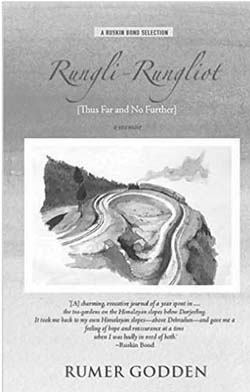In Chinglam, most of what I plan comes true and that has seldom happened to me in any other place. The days were stolen before they had begun; I think I never saw a day. When I was a child I remember days that stretched into infinity with the certainty of other infinite days; certain, unhurried and brimmingly full.
For the reader, the beauty of life in a solitary mountainous retreat in the North East is evoked in this very image of time hanging so heavy; the author’s day-to-day journal describes small and unrelated acts of quotidian life, human exchanges, and communion with nature, children and animals minutely one after the other as she reminisces about her life as a recluse for a year. The bottom line that holds these together is that of her not unequivocal bliss of solitude which is often not just magical and enigmatic but tedious, irksome and overwhelming in its all-pervasiveness. The incessant monsoons are not just depressing but contribute to the Teesta being a beautiful but menacingly cruel river that must take at least a life a year. The extreme isolation invokes a sort of gentle but enchanting melancholy. For the writer, the timeless beauty of the hills that she describes so lyrically is not an abstraction but a solace.
In the foreword, Ruskin Bond recalls being drawn to the book because of his identification with a home in the hills. He introduces the English writer of sixty books who spent a lot of time in India, whose novel The River was made into a film by Jean Renoir and who yet seems to have gone out of the list of the best authors of the twentieth century. He informs the reader that she retired to work and write in a tea estate near Darjeeling after she was ‘deserted by a fickle husband and forced to give ballroomdancing lessons in wartime Calcutta.’ We do not get any sneak peek into her private life otherwise, apart from her children. The reader is not even told who the boy Henry is who comes to live with them for a while and why.
In her diary, Rumer Godden wants to distil ‘the spirit or essential oils of Chinglam’, and thus begins with the legend of how the place (Rungli Rungliot—‘thus far and no urther’ in Pahadia) got its name. Chinglam is seven miles below Rungli Rungliot, on the Rungolo tea estate, overlooking the Runglee river. The alliterative names, with all that they mean to her, contribute to a Shangri-la in which the Second World War and the hardships it has unleashed the world over touches them only at the fringes. However, even the illiterate coolies at the homestead conjecture that the effigy of Guy Fawkes that is burnt on Guy Fawkes Day is that of Hitler..

